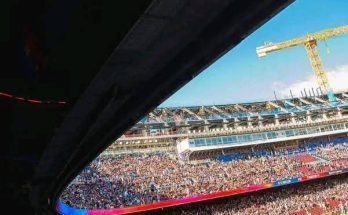Rammstein, the legendary German industrial metal band, is set to ignite stages worldwide with their signature blend of brutality and beauty, ritual and spectacle, sound and fire. More than a concert, each appearance is a statement — a provocation, an illusion, a communion with the darkness and with the crowd. With a history spanning over three decades, a devotion to theatrical excess, and an unshakable identity rooted in German language and imagery, Rammstein continues to challenge expectations, unsettle norms, and unite fans under the banner of controlled chaos.
From their origins in the crucible of post–Cold War Berlin, Rammstein’s formation in 1994 brought together six musicians — Till Lindemann, Richard Kruspe, Paul Landers, Oliver Riedel, Christoph Schneider, and Christian “Flake” Lorenz — who would remain the band’s unchanging core. (Wikipedia) Their music emerged in dialogue with electronic, industrial, hard rock, and metal traditions, yet it was, at its heart, defiantly German: German lyrics, German rhythms, German utterance. They would not pander to English; they would not dilute their identity for export. And so their breakthrough was not predictable. Yet when their second album, Sehnsucht (1997), delivered the eruptions of “Du Hast” and “Engel,” Rammstein became a global phenomenon, their fierce language and spacious riffs finding resonance even among those who didn’t understand the words. (Wikipedia) Their catalog would grow richer, darker, more expansive — Mutter, Reise, Reise, Liebe ist für alle da, Zeit — each album both a continuation and a disruption, a honing of extremes.
But what really sets Rammstein apart is what happens live. To call their concerts “immersive” is almost an understatement: the stage is as much a battleground as a platform, a theater of flame and steel. They do not light a show — they ignite it. Pyrotechnics are not an afterthought but a body, coursing through the performance. Explosions, flamethrowers, erupting columns, firewalls, burning costumes, high-pressure jets of flames — these are not simple gimmicks but tightly choreographed expressions of the music’s logic. (Metalhead Zone) Too many bands use smoke and fireworks; Rammstein uses them as cosmic punctuation, affirming that in their world sound and flame live in symbiosis. And such danger is literal: after an early stage accident in Berlin in 1996, they began employing professional pyrotechnic teams, and Till Lindemann himself became a licensed pyrotechnician to better synchronize his bodily stunts with the fire. (Wikipedia) Some songs demand it — “Feuer Frei!,” “Benzin,” “Mein Teil” — but in Rammstein’s universe, even the quietest passages may harbor tension waiting to erupt.
Beyond fire, the band’s aesthetic is built on extremes — stark costume design, mechanical contraptions, architectural sets, video projections, symbolic props. On earlier tours, the stage featured an industrial “mega fan,” rotating blades, hidden elevators, hydraulic lifts, trusses that disintegrated, and movable catwalks, all echoing the machine-heart of their sound. (PLSN) In their “Made in Germany” tour, for example, set builders created a colossal industrial structure bearing their logo, split open to let the band emerge, accented by fans and smoke machines built into the environment. (PLSN) No surface is passive; every truss, every screen is a potential stage for flame or descent, or a vector for narrative. They push not for maximum spectacle alone, but for spectacle that serves the ideas — the weight, the conflict, the tension in the music.
As they prepare to embark on new tours, including ambitious legs in 2025 and 2026 that promise fresh stage designs and provocative visuals, the band is in dialogue with its past rather than turning from it. (Justsportinfo) In some previews of the 2025 “Feuerzeit” tour, fans and insiders have teased rotating flame cannons, interactive zones bringing audiences closer to the furnace, massive LED firewalls, rising platforms, and cryptic rituals of spectacle. (Justsportinfo) Rumors swirl of new songs, a new album, of more daring visual experiments — hints enough to set anticipation ablaze. Their 2026 plans likewise promise to span their entire catalogue, to re‑lit the classics “Du Hast,” “Sonne,” “Engel,” along with newer works like “Zeit” and possibly unreleased cuts. (AllSportsVilla.com) Amid talk that it could be one of their final full-scale tours, fans are gearing up for what may be their most concentrated summation of the Rammstein experience yet.
And yet, this spectacle is not spectacle for its own sake. The band’s lyrics — often poetic, provocative, sometimes shocking — remain central. Rammstein tackles violence, sex, identity, political tension, human fragility, fate, history. They draw from German literature (Goethe, folk songs), reinterpret taboos, and inject ambiguity. (Wikipedia) Songs like “Deutschland” interrogate patriotism; “Mein Teil” confronts cannibalism and bodily horror; “Ich tu dir weh” plays with pain and consent. Critics have accused them of flirting with authoritarian aesthetics, even of harboring extremist sympathies, but the band repeatedly counters by embracing irony, ambiguity, multiple layers, and insisting they are apolitical (or ambiguously political) in the way Shakespeare is political. (Wikipedia) They responded to accusations in Germany by releasing the militant “Links 2‑3‑4,” asserting that their hearts beat left. (Wikipedia) Their willingness to inhabit tension is part of their identity: in every concert, the flames are a metaphor, the destruction a reflection, the ritual a question.
When they step onto a stage, Rammstein demands presence. You cannot drift — the fire, the drums, the guitars, the voices pull you in. The crowd becomes a surface for their ritual: rising heat, red glare, pulses in the floor, tactile presence. Their interaction is sculpted: they’ll ride boats over the audience, emerge in dioramas, walk catwalks suspended above, simulate conflict, break walls. (Metalhead Zone) Even in limited moments — the piano rendition of “Engel” on a B‑stage, the quieter interludes — they find space to breathe, to build dread, to heighten impact. Their control over dynamics — knowing when to silence the fireworks and let the guitar speak — is as essential as their mastery of excess.
For audiences, there is danger, catharsis, a kind of ecstasy. By the time the final explosions mark the close, you’ve been pulled through a labyrinth of sound and fire and spectacle. The difference between watching and being a part is slim. And for many, a Rammstein show becomes a badge — “I was there when the stage burned,” “I stood in the fire zone,” “I felt her breath behind the inferno.” Their concerts become stories, legends in the fandom.
But more than that, Rammstein’s consistency is surprising. Many bands that play with extremity either dwindle or become caricature; Rammstein has instead refined, deepened, sharpened. Their lineup remains untouched. Their identity remains German. Their fans remain fiercely loyal. Their live shows remain provocations, not nostalgic reproductions. In 2024, their European Stadium Tour, marking their 30th anniversary, saw them reintroduce rarely played songs such as “Asche zu Asche” and “Wiener Blut,” drawing audiences hungry for rediscovery. (Rammstein) The tour featured heavy pyrotechnics, costume upgrades, video segments, and reaffirmed that each show is crafted uniquely, not templated. (Rammstein) It was a reminder: they do not rest on laurels.
For anyone anticipating their upcoming world‑spanning itinerary, one should expect more than a concert. Expect an ordeal of light and heat, of sound and narrative, of physical tension and emotional confrontation. Expect to be both spectator and participant. Expect moments of quiet dread, sudden release, provocation, shock, beauty. Expect that when Rammstein leaves the stage, the air still carries whispers of flame, and your heartbeat will carry embers.
In a world where large-scale rock spectacle has sometimes become safe, polished, procedural, Rammstein remains the incendiary exception — the alchemists who fuse metal and theater into an elemental ritual. Their upcoming global run will not simply be a reaffirmation of their legacy; it will be a reaffirmation of what live music, at its wildest, can still mean. So brace yourself — because when Rammstein ignites the stage, they do not merely burn: they transcend, they confront, they cast shadows long after the final flame dies.



